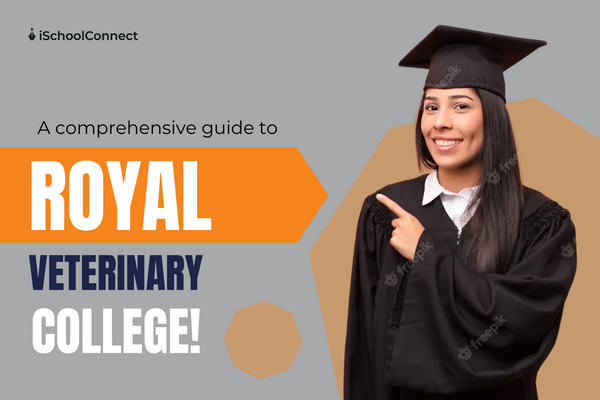Table of Contents
About the Royal Veterinary College (RVC)
Undergraduate and postgraduate programs in veterinary medicine, veterinary nursing, and biological sciences are available, as are CPD programs in veterinary medicine and veterinary nursing. The programs have an international appeal, attracting students who become practicing veterinarians, research scientists, veterinary nurses, and industry and government leaders. Royal Veterinary College owns and manages the London BioScience Innovation Centre, London’s first center for early-stage life science companies. It places the college at the epicenter of biotechnology and other biomedical research in London and opens the door to future collaboration.
Why study at RVC?
Before 2019, the college ranked first in Europe and third in the world for three years. It is the world’s largest and most established veterinary school in the English-speaking world.
The RVC also ranks in the top ten in the UK for biosciences, receiving a TEF Gold award for the quality of its teaching, learning environment, and educational and professional outcomes for students.
Founded in 1791, Royal Veterinary College became a member of the University of London in 1949.
The college encourages students to participate in a practical learning experience. It exposes students to a Small Animal Referrals hospital, a first-opinion practice, an equine hospital, a farm, diagnostic services, and the opportunity to continue professional development. The small-animal referral hospital is Europe’s largest and most highly regarded teaching hospital, with the highest concentration of 95 veterinary specialists (from more than 20 countries). It treats over 7,000 cases each year.
Reputation
The RVC is famous for its innovative approaches to teaching, learning, and clinical care, which place it at the forefront of veterinary and biological science.
The RVC is the top veterinary school in the Agriculture, Veterinary, and Food Science unit of the most recent Research Assessment Exercise, with 55% of academics producing world-class and internationally excellent research.
The college also has a vibrant international community, with students from 54 countries and faculty from 95 countries.
Alumni hold senior positions in veterinary practice, industry, academia, and government in the UK and worldwide.
What makes RVC stand out?

- It is one of the few veterinary schools in the world whose veterinary medicine courses have accreditations from the RCVS in the United Kingdom (with reciprocal recognition from the AVBC in Australasia, the VCI in Ireland, and the SAVC in South Africa), the EAEVE in the European Union, and the AVMA in the United States and Canada.
- The veterinary nursing courses have accreditations from ACOVENE and the RCVS, and biological sciences courses have accreditations from the Royal Society of Biology.
- According to the QS World University Rankings by Subject, 2022, the RVC is the best veterinary school in the world.
- The college has a Gold award from the Teaching Excellence Framework (TEF) in 2017, the highest rating a university can receive.
- The Research Excellence Framework 2021 rates 88% of RVC’s research as internationally excellent or world-class.
Royal Veterinary College rankings
- Ranks 1st in Veterinary Sciences as per QS World University Ranking 2021
- Ranks 401-500 in World University Ranking by Times Higher Education Rankings
- Ranks 941st in Best Global University by US News and World Report
- Ranks 376th in Best Global University in Europe by US News and World Report
- Ranks 66th in Best Global University of the UK by US News and World Report
Campus

The Royal Veterinary College has two campuses, Camden and Hawkshead. The college connects well to both campuses and is only a short distance apart.
Camden campus
- The historic Camden campus in central London is home to veterinary medicine and biosciences students.
- The Anatomy Museum on the campus houses a diverse collection of veterinary history and animal anatomy.
- The campus’s First Opinion Animal Hospital provides a variety of services for pets, including exotic services.
- Camden is home to the London Bioscience and Innovation Centre. The campus is home to 40 biotechnology and life sciences companies ranging from small start-ups to global corporations.
- The Lightwell café on campus serves coffee and provides students with access to quiet private areas for work, gym, and other activities.
- Other appealing campus amenities include a learning resource center, a dissection room, group study rooms, learning rooms, a library, and lecture theatres.
Hawkshead campus
- The dynamic campus in Hertfordshire houses final-year veterinary nursing and veterinary medicine, students.
- The Small Animal Referrals hospital on campus is one of the most advanced veterinary hospitals, treating approximately 7000 cases yearly.
- Equine Hospital specializes in equine health management and veterinary research, and it offers a 24-hour emergency service with ambulances.
- The 200-hectare Bolton Park Farm, with a 45-year history, provides an animal teaching facility on the campus.
Courses at RVC
The Royal Veterinary College offers undergraduate and postgraduate in veterinary sciences, biological sciences, and veterinary nursing.
- Royal Veterinary College offers popular bachelor courses such as BSc Animal Biology, Bachelor of Veterinary Medicine (BVetMed), BSc Veterinary Nursing, and BSc Biological Sciences.
- Bachelor of veterinary medicine (BVetMed) is a well-known program. It is a five-year full-time bachelor’s degree program offered at both campuses. They teach the first two years at the Camden campus and the remaining three at the Hawkshead campus.
- Through its academic departments of comparative biomedical sciences, clinical science and services, pathobiology and population sciences, and professional services, RVC offers a wide range of postgraduate programs.
Royal Veterinary College admissions
Applicants seeking admission to the Royal Veterinary College must follow the below admissions process-
- Application portal- UG- UCAS, PG- UKPASS
- Application fees- 20 GBP
Documents required
- Official academic transcripts
- Statement of purpose
- Copy of passport
- Two academic letters of recommendation
- English language proficiency test scores
Key takeaways
- The RVC is the world’s only veterinary school with accreditations from the AVMA (American Veterinary Medical Association), EAVE (European Association of Establishments of Veterinary Education), and more.
- The depth and breadth of the veterinary and biomedical science research demonstrate the college’s dedication to improving human and animal health and welfare.
- A degree from the Royal Veterinary College has international recognition as a mark of exceptional quality. It symbolizes hard work and dedication and distinguishes graduates as professionals of the highest caliber.
Did you find this blog helpful? Do share your thoughts in the comments below. Please contact us by clicking here for more information on the Royal Veterinary College. We would be happy to assist you with your queries.
Liked this blog? Read next: An overview of Bradley University world ranking
FAQs
Q1. What is the accommodation facility at RVC?
Answer- RVC offers lodging on both of its campuses. The accommodations are well-equipped, have advanced facilities, and are close to both campuses.
Q2. What is the Royal Veterinary College’s acceptance rate?
Answer- The Royal Veterinary College’s acceptance rate is 38%. The admissions are competitive, and with the necessary scores and documents, you can get into RVC.
Q3. What do the Learning Resources Centers at the campus provide?
Answer- The Learning Resources Centres in Hawkshead and Camden offer a variety of facilities tailored to students’ learning needs, and they constantly upgrade and refurbished to improve the user experience.







